Charles E W Bean, Diaries, AWM38 3DRL 606/262/1 - 1916 - 1934 - Part 1
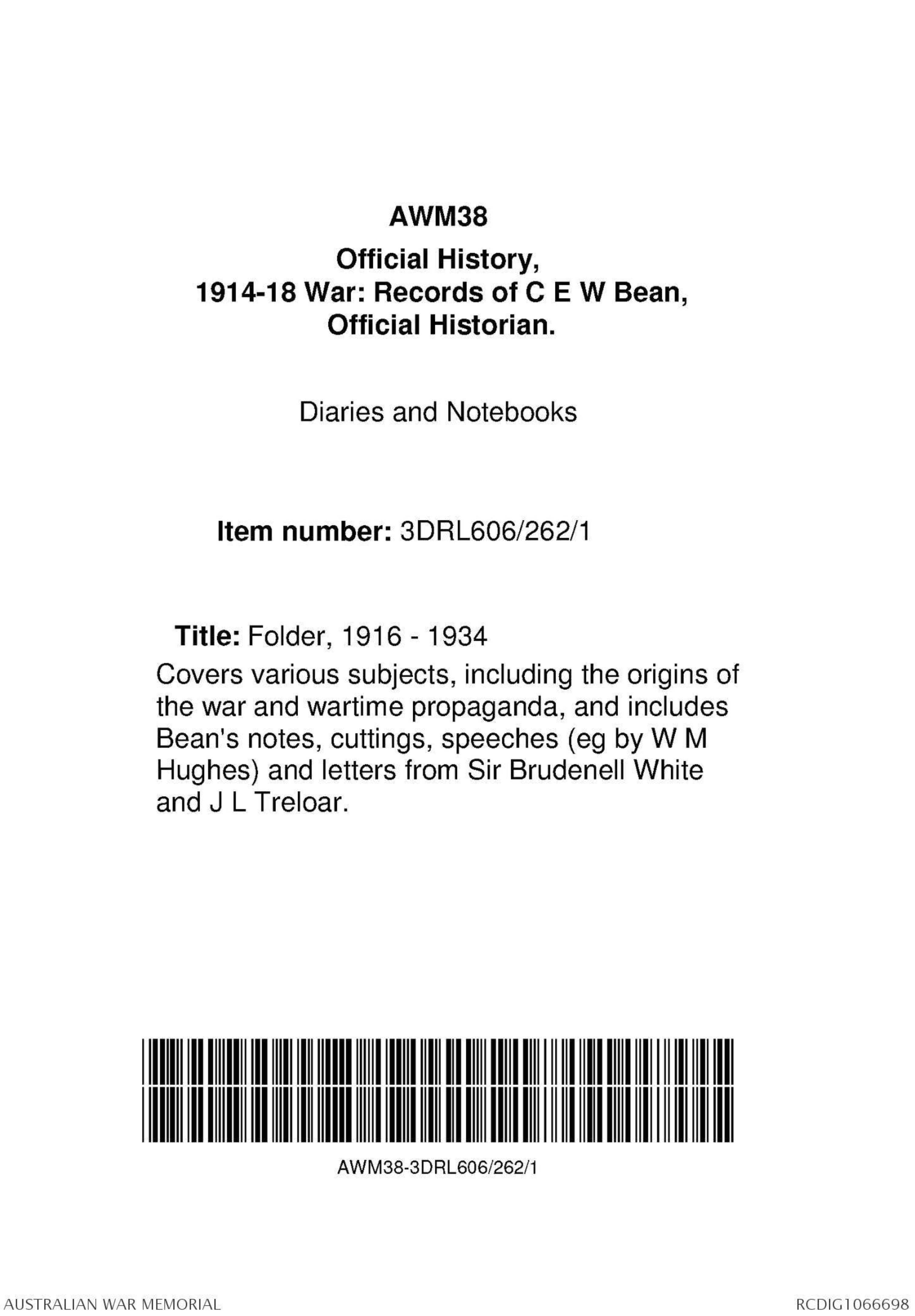
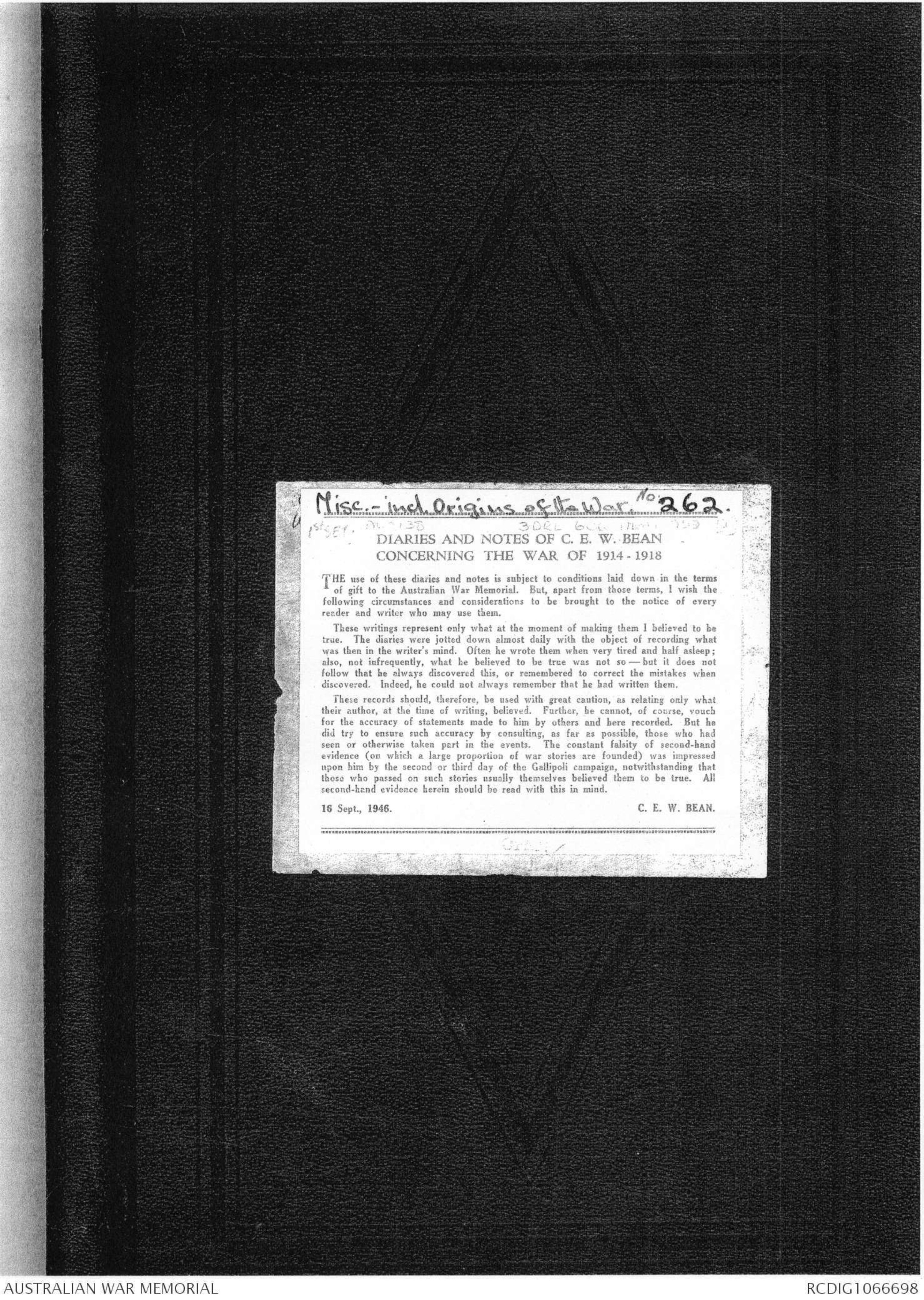
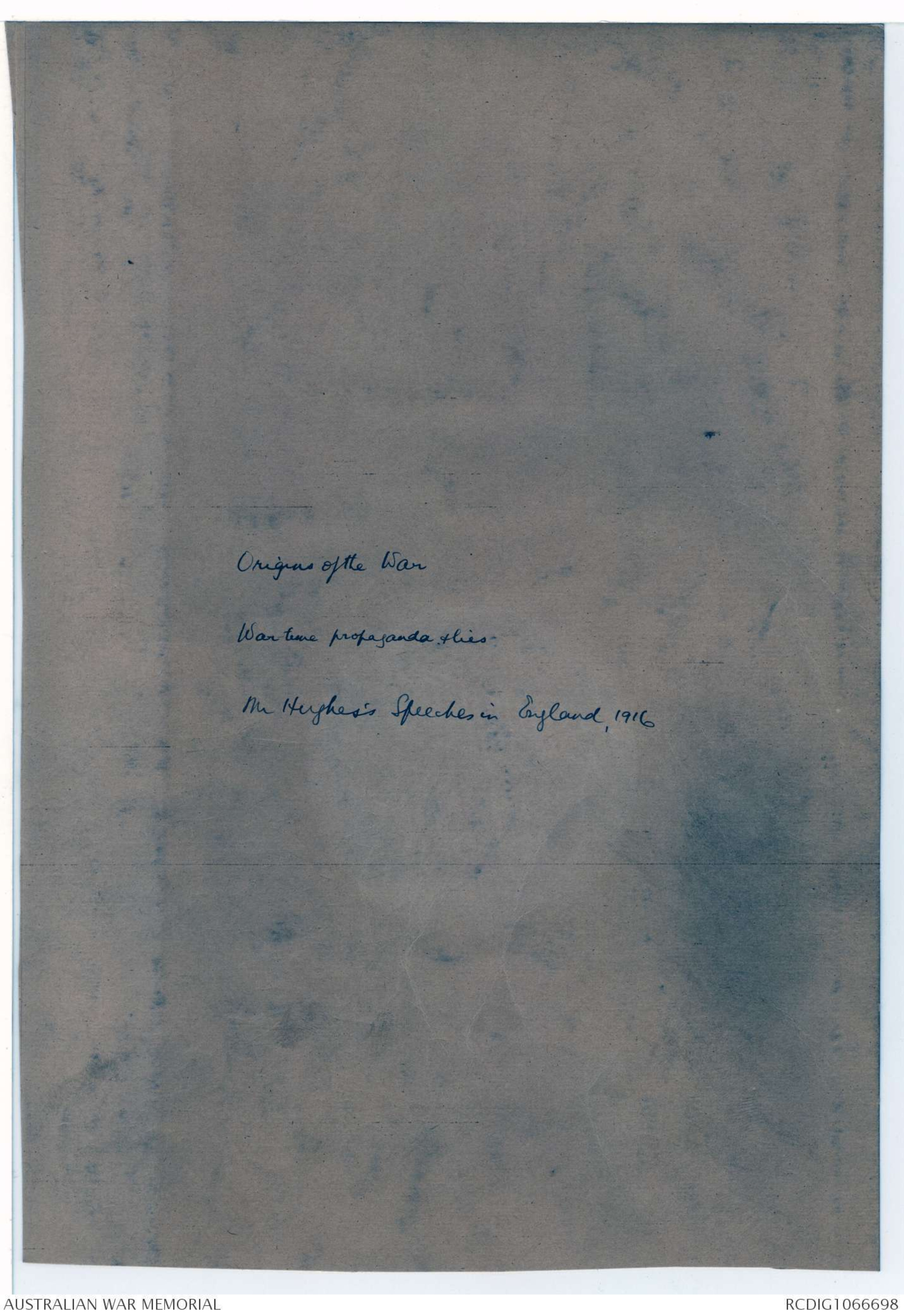
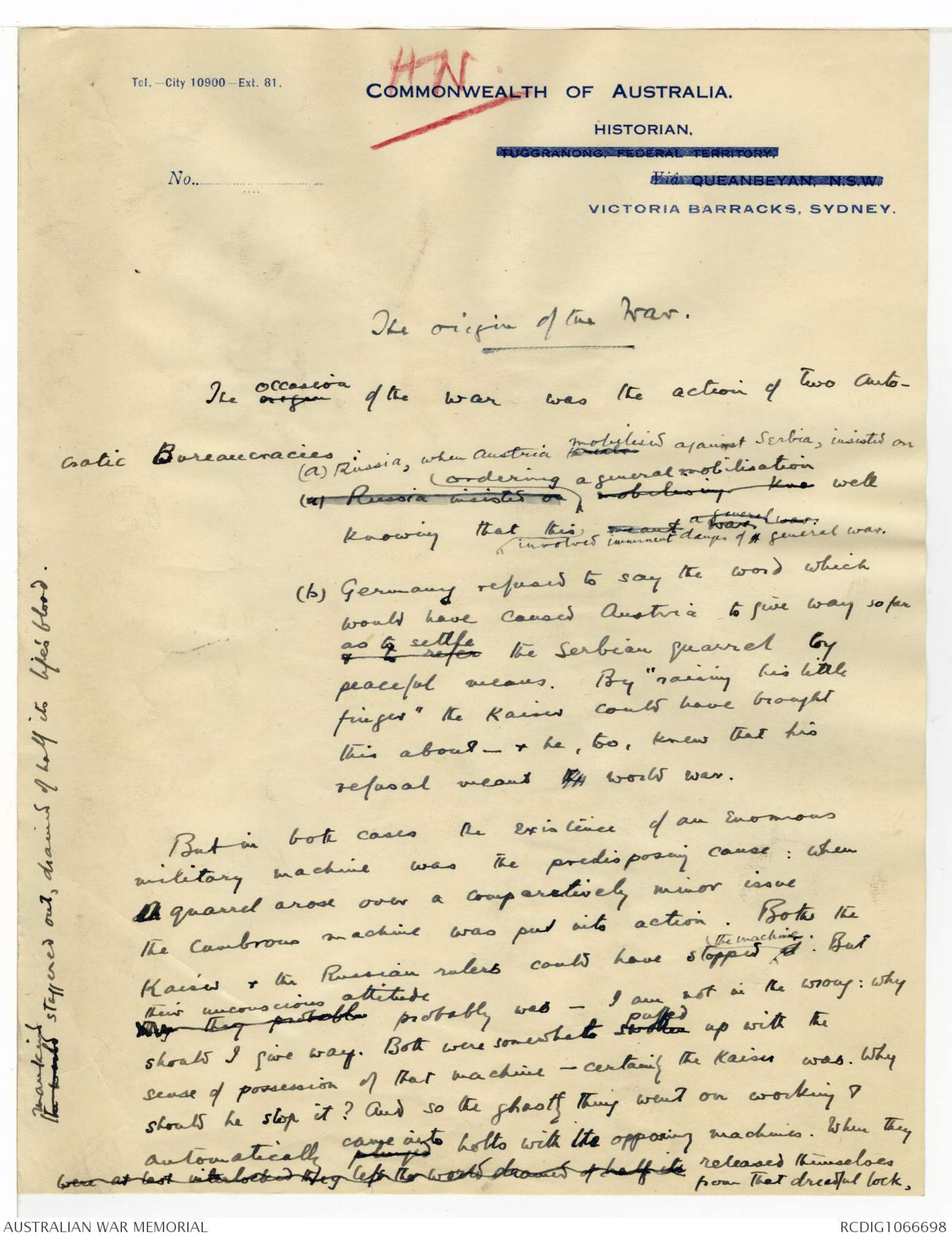
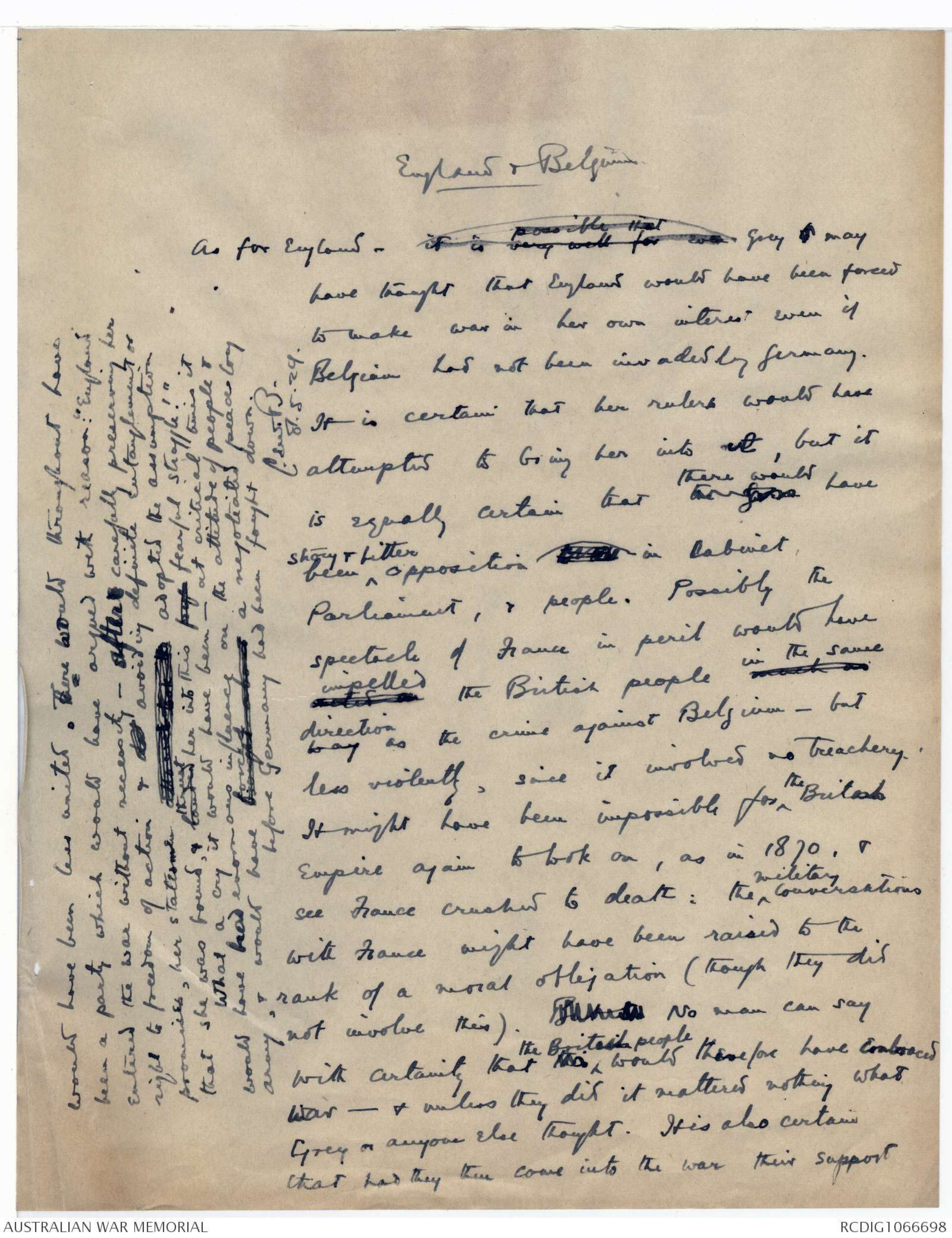
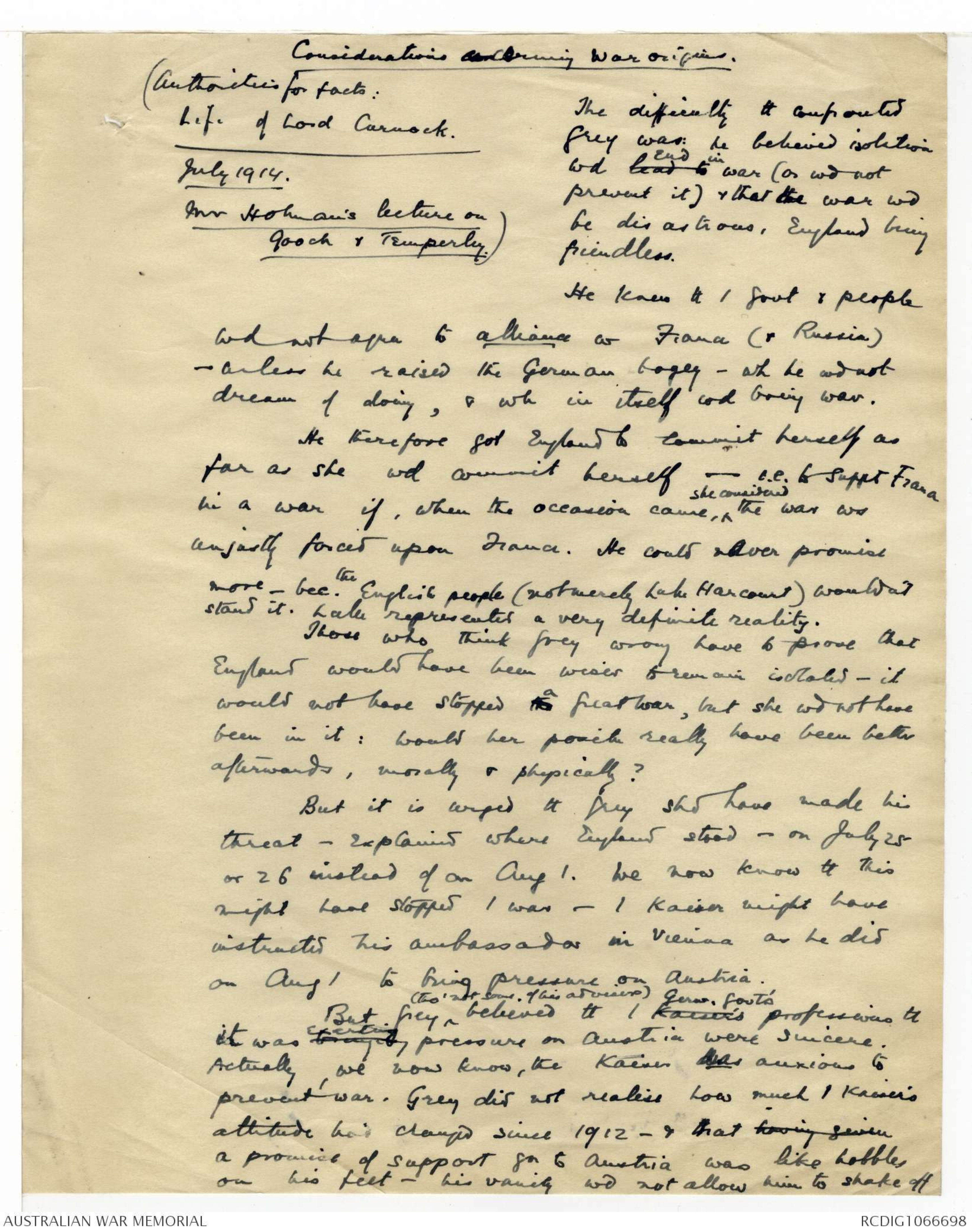
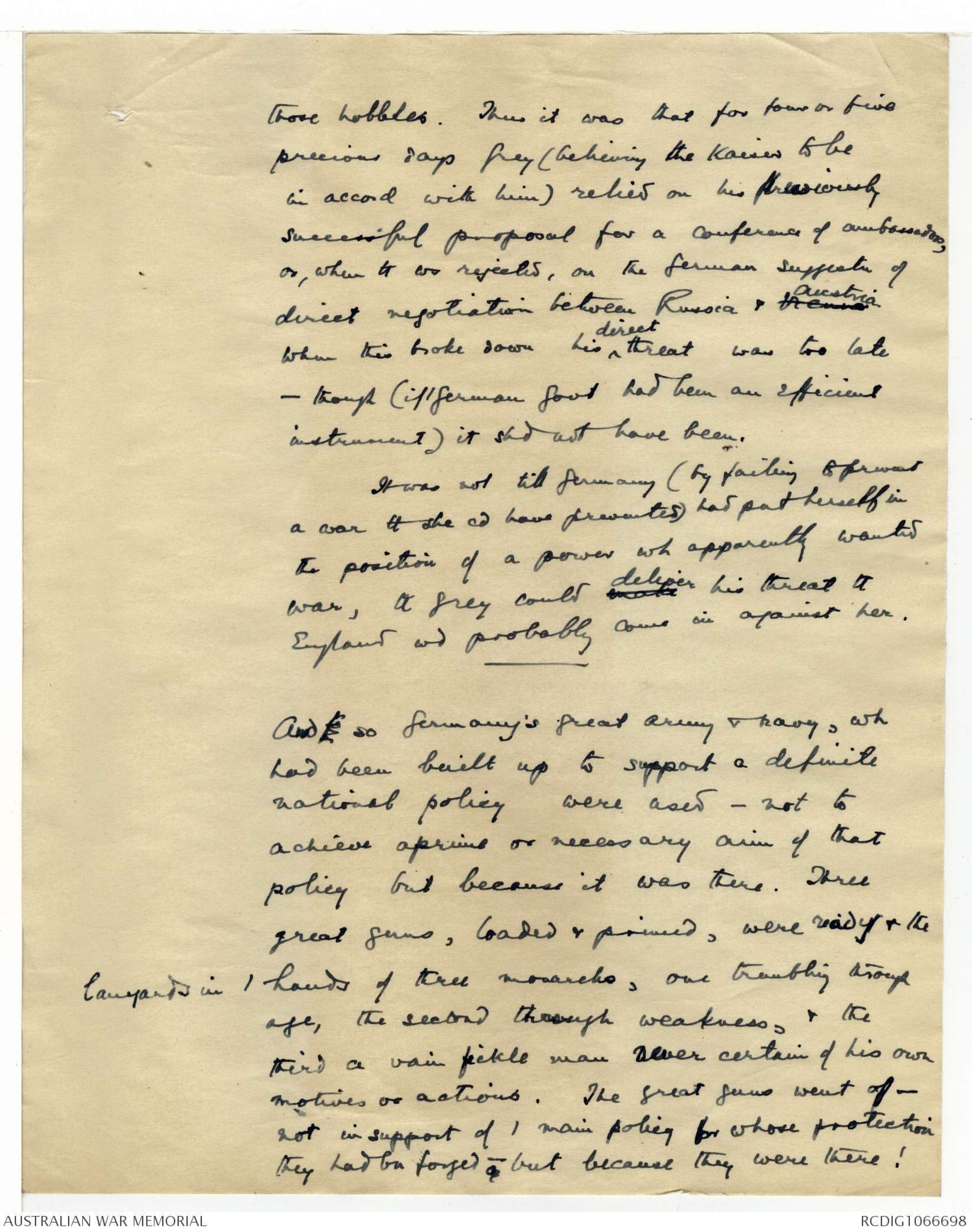
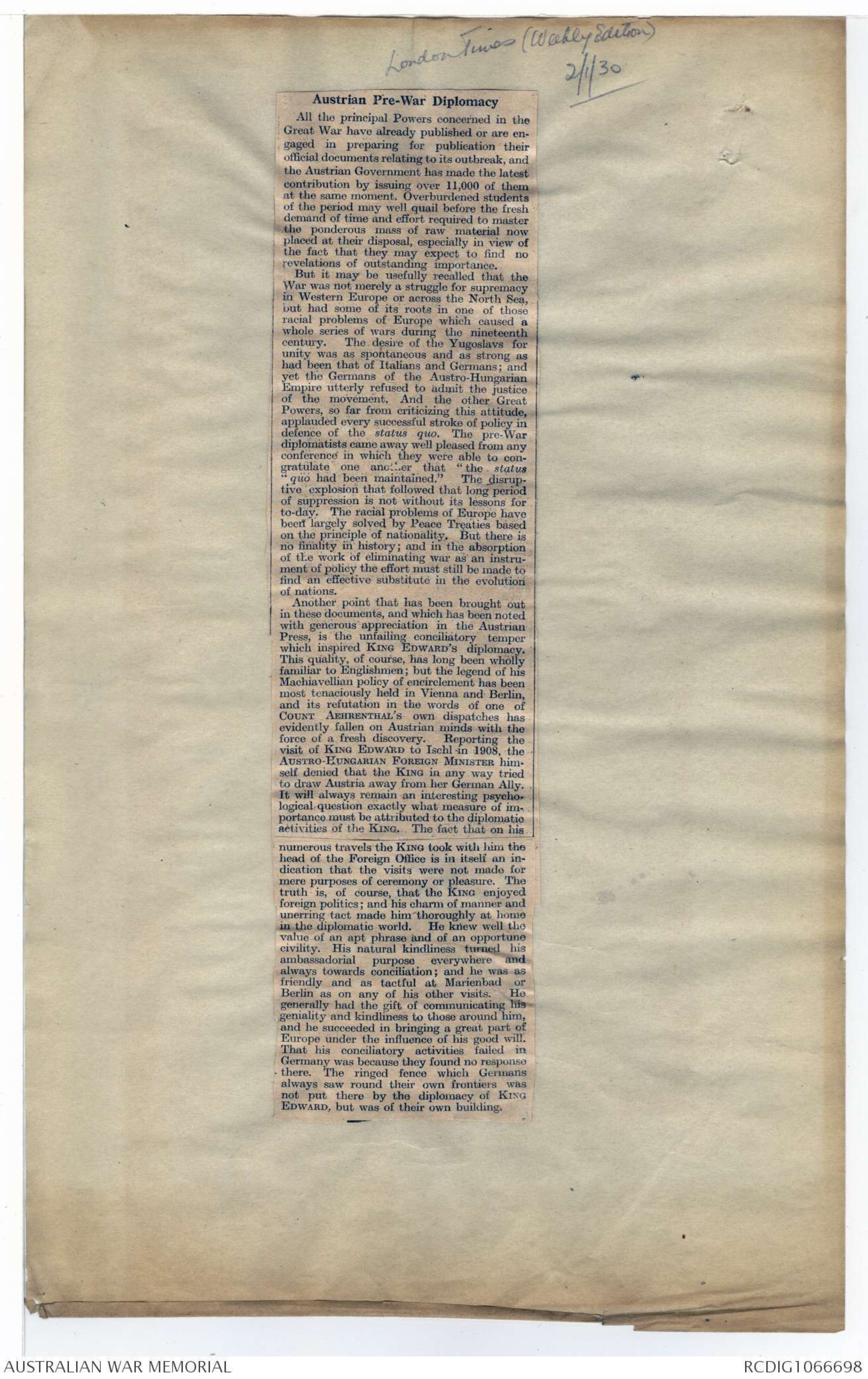
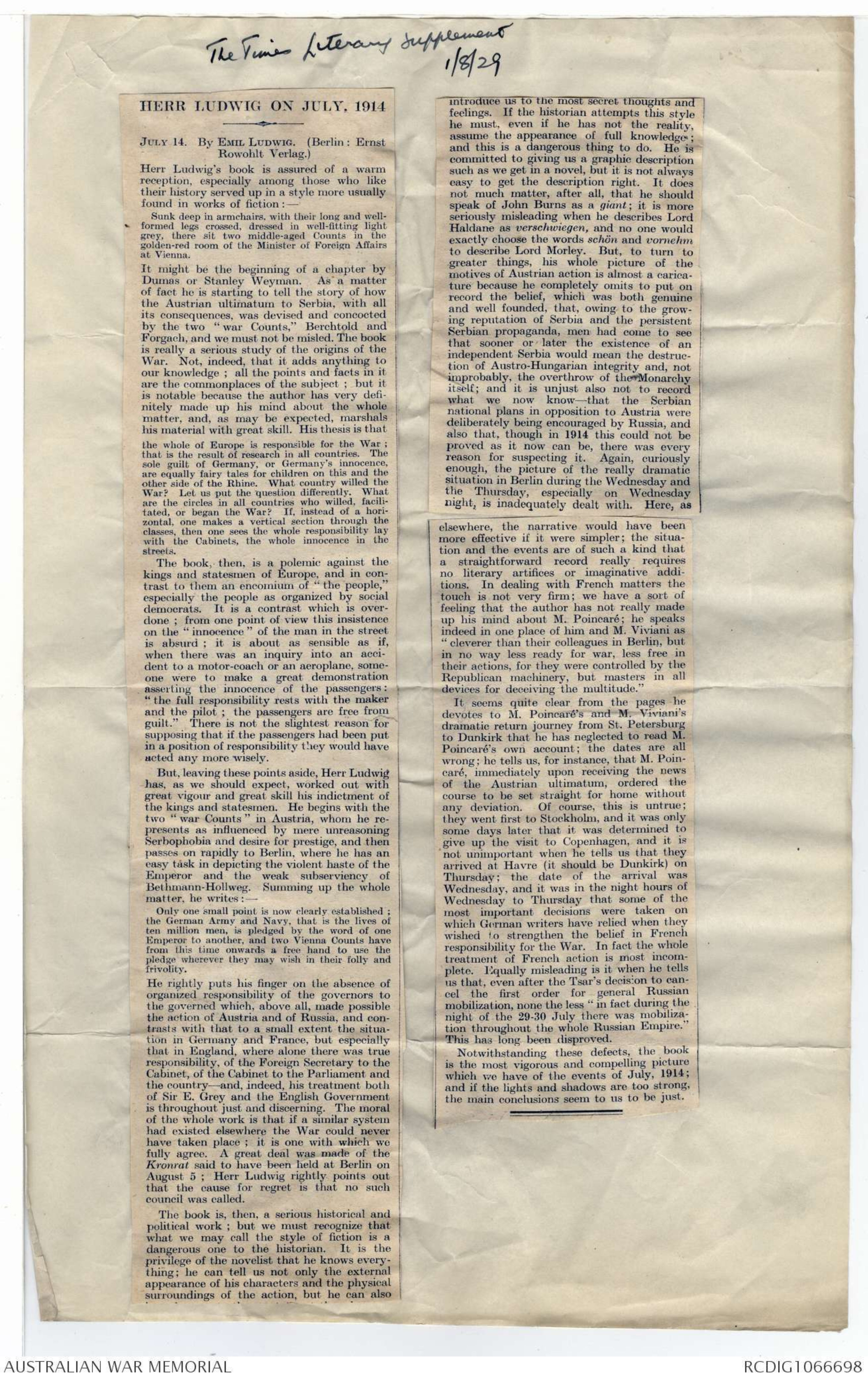
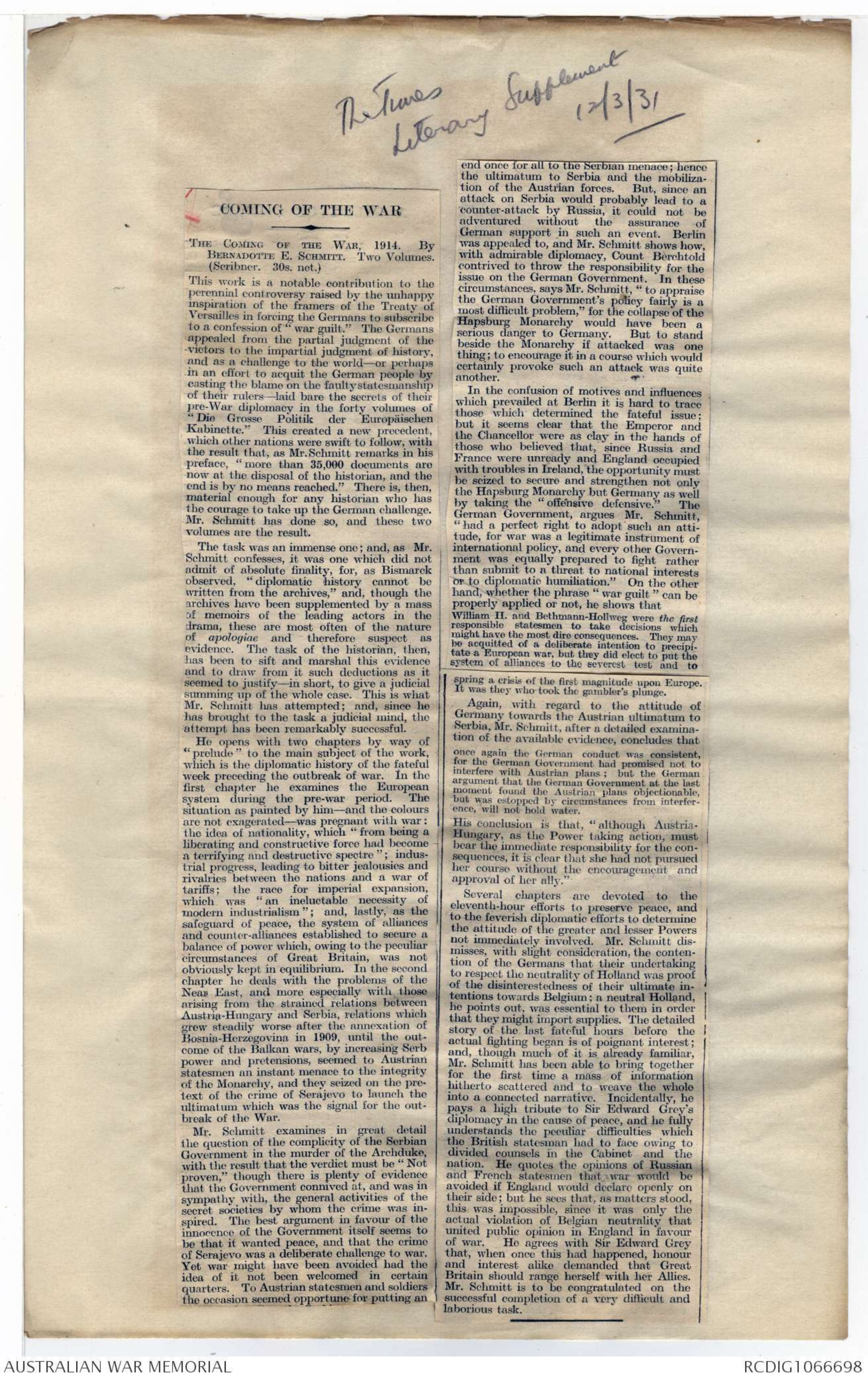
AWM38
Official History,
1914-18 War: Records of C E W Bean,
Official Historian.
Diaries and Notebooks
Item number: 3DRL606/262/1
Title: Folder, 1916 - 1934
Covers various subjects, including the origins of
the war and wartime propaganda, and includes
Bean's notes, cuttings, speeches (eg by W M
Hughes) and letters from Sir Brudenell White
and J L Treloar.
AWM38-3DRL606/262/1
Misc. - incl. Origins of the War. No. 262.
1st SET. AWM 38 3 DRL 606 ITEM [[355?]]
DIARIES AND NOTES OF C. E. W. BEAN
CONCERNING THE WAR OF 1914 - 1918
THE use of these diaries and notes is subject to conditions laid down in the terms
of gift to the Australian War Memorial. But, apart from those terms, I wish the
following circumstances and considerations to be brought to the notice of every
reader and writer who may use them.
These writings represent only what at the moment of making them I believed to be
true. The diaries were jotted down almost daily with the object of recording what
was then in the writer’s mind. Often he wrote them when very tired and half asleep;
also, not infrequently, what he believed to be true was not so —but it does not
follow that he always discovered this, or remembered to correct the mistakes when
discovered. Indeed, he could not always remember that he had written them.
These records should, therefore, be used with great caution, as relating only what
their author, at the time of writing, believed. Further, he cannot, of course, vouch
for the accuracy of statements made to him by others and here recorded. But he
did try to ensure such accuracy by consulting, as far as possible, those who had
seen or otherwise taken part in the events. The constant falsity of second-hand
evidence (on which a large proportion of war stories are founded) was impressed
upon him by the second or third day of the Gallipoli campaign, notwithstanding that
those who passed on such stories usually themselves believed them to be true. All
second-hand evidence herein should he read with this in mind.
16 Sept., 1946. C. E. W. BEAN.
Origins of the War
War time propaganda & lies
Mr Hughes's Speeches in England, 1916
[*HN.*]
Tel.—City 10900—Ext. 81.
COMMONWEALTH OF AUSTRALIA.
HISTORIAN,
No......TUGGRANONG FEDERAL TERRITORYVia QUEANBEYAN, N.S.W.
VICTORIA BARRACKS, SYDNEY.
The origin of the War.
The origin occasion of the war was the action of two autocratic
Bureaucracies:
(a) Russia, when Austria threaten mobilised against Serbia, insisted on(a) Russia insisted on ^ordering a general mobilisation mobilising kno well
knowing that this meant war a general war: ^involved imminent danger of a general war.
(b) Germany refused to say the word which
would have caused Austria to give way so far& to refer as to settle the Serbian quarrel by
peaceful means. By "raising his little
finger” the Kaiser could have brought
this about - & he, too, knew that his
refusal meant the world war.
But in both cases the existence of an enormous
military machine was the predisposing cause: when
a quarrel arose over a comparatively minor issue
the cumbrous machine was put into action. Both the
Kaiser & the Russian rulers could have stopped it ^the machine. Butthey they probabl their unconscious attitude probably was - I am not in the wrong: why
should I give way. Both were somewhat swollen puffed up with the
sense of possession of that machine - certainly the Kaiser was. Why
should he stop it? And so the ghastly thing went on working &
automatically plunged came into holts with the opposing machines. When theywere at last interlocked they left the world drained of half its released themselves
from that dreadful lock,
[*The world mankind staggered out, drained of half its life’s blood.*]
England & Belgium
As for England - it is very well for even possibly that for Grey xx may
have thought that England would have been forced
to make war in her own interest even if
Belgium had not been invaded by Germany.
It is certain that her rulers would have
attempted to bring her into it, but it
is equally certain that the Germs there would have
been ^strong & bitter opposition xxxx in Cabinet,
Parliament, & people. Possibly the
spectacle of France in peril would haveacted on impelled the British people much as in the sameway direction as the crime against Belgium - but
less violently, since it involved no treachery.
It might have been impossible for ^the British
Empire again to look on, as in 1870, &
see France crushed to death: the ^military conversations
with France might have been raised to the
rank of a moral obligation (though they did
not involve this). But really No man can say
with certainty that this ^the British people would therefore have embraced
war - & unless they did it mattered nothing what
Grey or anyone else thought. It is also certain
that had they then come into the war their support
would have been less united. There would throughout have
been a party which would have argued with reason: "England
entered the war without necessity - after r carefully preserving her
right to freedom of action & def avoiding definite entanglement or
promises, her statesmen all went & took its adopted the assumption
that she was bound, & landed thrust her into this perf fearful struggle!"
What a cry it would have been - at critical times it
would have had enormous influence on the attitude of people &
army, & would have brought about forced a negotiated peace long
before Germany had been fought down.
C.E.W.B.
87.5.29*]
Considerations concerning War origins.
[*(Authorities for facts:
Life of Lord Carnock.
July 1914.
Mr Holman's lecture on
Gooch & Temperley)*]
The difficulty tt confronted
Grey was: he believed isolation
wd lead to end in war (or wd not
prevent it) & that the war wd
be disastrous, England being
friendless.
He knew tt / Govt & people
wd not agree to alliance w France (& Russia)
- unless he raised the German bogey - wh he wd not
dream of doing, & wh in itself wd bring war.
He therefore got England to commit herself as
far as she wd commit herself - i.e. to suppt France
in a war if, when the occasion came, ^she considered the war ws
unjustly forced upon France. He could never promise
more - bec. the English people (not merely Lulu Harcourt) wouldn't
stand it. Lulu represented a very definite reality.
Those who think Grey wrong have to prove that
England would have been wiser to remain isolated – it
would not have stopped the a great war, but she wd not have
been in it: Would her positn really have been better
afterwards, morally & physically?
But it is urged tt Grey shd have made his
threat - explained where England stood - on July 25
or 26 instead of on Aug 1. We now know tt this
might have stopped / war - / Kaiser might have
instructed his ambassador in Vienna as he did
on Aug 1 to bring pressure on Austria.
But Grey ^(tho' not some of his advisers) believed tt / Kaiser's Germ. Govt's professions tt
it was bringing exerting pressure on Austria were sincere.
Actually, we now know, the Kaiser was anxious to
prevent war. Grey did not realise how much / Kaiser's
attitude had changed since 1912 - & that having given
a promise of support gn to Austria was like hobbles
on his feet - his vanity wd not allow him to shake off
those hobbles. Thus it was that for four or five
precious days Grey (believing the Kaiser to be
in accord with him) relied on his previously
successful proposal for a conference of ambassadors,
or, when tt ws rejected, on the German suggestn of
direct negotiation between Russia & Vienna Austria.
When this broke down his ^direct threat was too late
- though (if / German Govt had been an efficient
instrument) it shd not have been.
It was not till Germany (by failing to prevent
a war tt she cd have prevented) had put herself in
the position of a power wh apparently wanted
war, tt Grey could make deliver his threat tt
England wd probably come in against her.
And / so Germany's great army & navy, wh
had been built up to support a definite
national policy were used - not to
achieve a prime or necessary aim of that
policy but because it was there. Three
great guns, loaded & primed, were ready & the
lanyards in / hands of three monarchs, one trembling through
age, the second through weakness, & the
third a vain fickle man never certain of his own
motives or actions. The great guns went off -
not in support of / main policy for whose protection
they had bn forged & - but because they were there!
London Times (Weekly Edition)
2/1/30
Austrian Pre-War Diplomacy
Newspaper article - see original document
The Times Literary Supplement
1/8/29
HERR LUDWIG ON JULY, 1914
Newspaper article - see original document
The Times
Literary Supplement
12/3/31
COMING OF THE WAR
Newspaper article - see original document
 Deb Parkinson
Deb ParkinsonThis transcription item is now locked to you for editing. To release the lock either Save your changes or Cancel.
This lock will be automatically released after 60 minutes of inactivity.